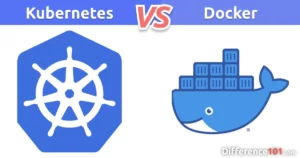
Containers have transformed the way we develop, package, and deploy applications. When it comes to containerization, Kubernetes and Docker are two popular names that often come up. In this blog, we will explore the differences between Kubernetes and Docker (Docker vs Kubernetes), their roles in the container ecosystem, and how they complement each other in building scalable and efficient container-based applications.
What is docker?
Docker is an open-source platform based on Linux containers for developing, shipping, and running applications inside containers. we can deploy many containers simultaneously on a given host. Containers are very fast and lightweight because they don’t need the extra load of a hypervisor in comparison to the virtual machines because they run directly within the host machine’s kernel.
Docker is a popular containerization platform that enables developers to package applications and their dependencies into lightweight, portable containers. It provides a consistent runtime environment, ensuring that applications run seamlessly across different systems and environments. Docker simplifies the process of creating, distributing, and running containerized applications, making it a favorite choice for local development and single-host deployments.
What is Kubernetes?
Kubernetes, often referred to as K8s, is an open-source container orchestration platform designed to automate the deployment, scaling, and management of containerized applications. It focuses on managing clusters of containers, providing advanced features for workload distribution, scaling, and fault tolerance. Kubernetes abstracts away the underlying infrastructure, allowing developers to focus on application logic rather than the complexities of deployment and scaling.
Docker Limitations

a) Dynamic IP: The problem with docker is it uses a dynamic IP address. When we restart the container the IP address will change because IP is not static in Docker.
b) Ephemeral data storage: In docker storage, we have Ephemeral storage, not persistence storage due to this all of the data inside a container disappears forever when the container shuts down.
c) Confined to Single Host: In Docker, we can multiple containers on different hosts. Inside a single host, we can connect multiple containers to each other via a bridge network but we can’t connect two containers that are running on different hosts.
Docker Vs Kubernetes: The Difference
A fundamental difference between Kubernetes and Docker is that Kubernetes is meant to run across a cluster while Docker runs on a single node. Docker is the most popular container platform and Kubernetes is a platform for managing containerized workloads. Kubernetes can work with any containerization technology. Kubernetes helps with Docker networking, load-balancing, security, and scaling across all Kubernetes nodes which run your containers.
Docker and Kubernetes play distinct roles in the container ecosystem. Docker is used for creating and running containers, while Kubernetes is used for managing and automating the deployment, scaling, and operation of containers across clusters of hosts Docker serves as a container runtime, providing the tools and infrastructure to create and manage containers. It encapsulates applications, libraries, and dependencies into isolated units, enabling easy application packaging and portability. Kubernetes, on the other hand, acts as an orchestration platform, managing the lifecycle of containers and coordinating their distribution and scaling across clusters.
| Docker Containers | Kubernetes |
| Docker is the tool to deploy containers. | Kubernetes is a Container Orchestration tool. |
| Docker runs on a single node. | Kubernetes is meant to run across a cluster |
| In Docker Communication between two different nodes is not possible. | Using Kubernetes different nodes can communicate with each other. |
| Docker Swarm is used to managing containers which comes with the enterprise edition and not preferred by most companies. | Kubernetes is an open-source platform also, this is widely used in industries. |
| Docker automatic scaling and failover for your application running on the container not possible. | Kubernetes takes care of scaling and failover for your application running on the container. |
Containerization and Image Management
Docker excels in containerization, offering a streamlined approach to creating and managing container images. It provides a simple and efficient way to package applications, ensuring consistent deployments across different environments. Docker images can be easily versioned, shared, and deployed, making it an ideal choice for developers looking for fast and efficient containerization.
Docker Vs Kubernetes: Orchestration and Scalability
Where Docker shines in containerization, Kubernetes excels in orchestration. Kubernetes automates container deployment, scaling, and management, providing advanced features for load balancing, self-healing, and auto-scaling. It allows you to define desired states for your applications, and Kubernetes takes care of maintaining that state, ensuring high availability and efficient resource utilization.
Docker Vs Kubernetes: Networking and Service Discovery
Docker provides basic networking capabilities, allowing containers to communicate with each other and the host system. However, Kubernetes offers a more advanced networking model, providing service discovery, load balancing, and network policies out of the box. Kubernetes introduces the concept of Services, which act as stable network endpoints for accessing applications running within containers.
Docker Vs Kubernetes: Resource Management and Scheduling
Kubernetes provides robust resource management and scheduling capabilities. It allows you to define resource requirements and constraints for your applications, ensuring efficient resource allocation across the cluster. Kubernetes’ powerful scheduler intelligently places containers on available nodes based on resource availability, affinity rules, and anti-affinity rules. Docker, while offering basic resource management, lacks the advanced scheduling features provided by Kubernetes.
High Availability and Fault Tolerance
Kubernetes incorporates built-in mechanisms for achieving high availability and fault tolerance. It supports pod replication, which ensures that a specified number of identical containers are always running to provide resilience against failures. Kubernetes also supports rolling updates, enabling seamless updates and rollbacks of application deployments. Docker Swarm, Docker’s native orchestration solution, provides limited high availability options compared to Kubernetes.
When to Choose Docker or Kubernetes?
Choosing between Docker and Kubernetes depends on your specific use cases and requirements. Docker is ideal for local development, rapid prototyping, and simple single-host deployments. It provides an intuitive interface and excellent containerization capabilities. On the other hand, Kubernetes shines in complex, multi-node production environments where scalability, resilience, and advanced orchestration features are required.
Conclusion
Docker and Kubernetes are not direct competitors but complementary tools in the container ecosystem. Docker excels in containerization and image management, while Kubernetes focuses on orchestration and scalability. Leveraging Docker for containerization and Kubernetes for orchestration allows developers to build scalable, resilient, and portable applications. Understanding the strengths of each tool and harnessing their synergy is key to unlocking the full potential of containerized environments.





